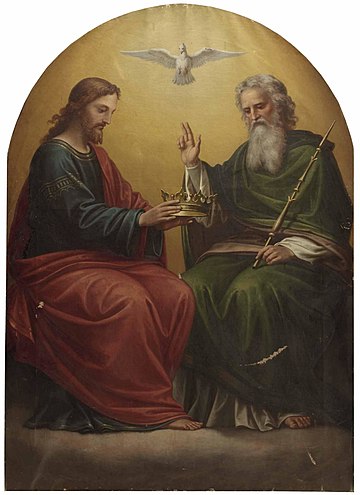The Sermon
By the Revd Dr Alan Billings.
When we begin our services we often do so, ‘In the name of the Father, and of the Son and of the Holy Spirit’. When I begin a sermon I pray that I may preach, ‘In the name of the Father and of the Son and of the Holy Spirit.’ Last Sunday I baptised a baby into the Christian faith, ‘In the name of the Father, and of the Son and of the Holy Spirit’. And at the end of the service I ask that we may be blessed by God Almighty, ‘the Father, the Son and the Holy Spirit.’
I don’t think we can be in any doubt that the Christian faith is what we call Trinitarian. God is understood in a particular way. And its very different from the way our Jewish and Muslim friends think about God.
So how did we Christians come to think like this and does it matter? Does it make a difference?
I think we can say that the first Christians came to a Trinitarian faith gradually, as they started to think long and hard about their experiences.
The very first Christians, the very first followers of Jesus, after his death and resurrection, were Jews, like Jesus himself. As Jews they believed in the reality of one God.
When the Jews looked around them at other people who lived in their part of the world, they saw the temples of the Romans, the Greeks and the Egyptians – all dedicated to any number of gods. If you went inside their temples you would find images and statues of numerous gods and goddesses.
We are familiar with some of their names: The gods and goddesses of Rome: Jupiter, Juno, Diana and Janus. The Greek: Zeus, Hera, Poseidon, Pluto, Mars. The Egyptian: Isis, Anubis, Horus, Osiris, Sekhmet.... We could go on and on because the number of these gods goes on and on – they were polytheistic – not one God but many...... and their temples were full of their images.
But if you went into the Jewish temple in Jerusalem, something that Jesus did many times during the course of his life, and if you had gone right into the heart of the temple, into the holy of holies, where only the High Priest could go, what would you see? You would see nothing. No image, no statue. No attempt to represent God. You would see nothing. Because for Jews the reality that was God could not be captured or confined in any way, and could certainly not be reduced to an image. The reality they called God had brought all things into being, the creator of all that is, present in all times and places; he could not be reduced to an image or trapped in a building made by human hands.
So the first follower of Jesus were very clear. Their Jewish experience had taught them to believe in the reality of one God.
But that reality had collided with another. They found themselves turning to Jesus as if he were God. He had taught them with the authority that properly belonged to God. They had listened to him as they would listen to God. And they had given him the love and devotion that they would give to God.
And so a second reality had made them think again.
And then, as we heard last week, after the risen Lord told them they would no longer see him, the time of his visible appearances was over, they experienced what he promised them, the abiding presence of the Holy Spirit. And they could not deny the reality of the Spirit in their lives.
Three realities. Yet one God.
We can see how the Christian understanding of God came to be. They had encountered three realities and could not deny any of them. But not three gods. Three realities but one God.
Does it matter that we know God as Father, Son and Holy Spirit, three realities, three persons, in one God?
It certainly makes a difference to how we think about God. At the heart of godhead in our way of thinking, there is not alone-ness but sociability, community, mutuality. At the heart of godhead in our way of thinking there is already before the creation of the world, the love between Father, Son and Spirit. We can only really say God is love if God is Trinity because love is what happens between beings.
And if we are made in the image of God, as our faith also teaches us, then we are made in the image of the God who is love, who is sociability, community, mutuality. Our purpose, our happiness lies that way too.
It could not have been easy for the first Christians to realise what had happened to their understanding of God. But they could not deny the reality of their experience, and we cannot deny the reality of ours: there is one God but we meet him as Father, Son and Holy Spirit.


